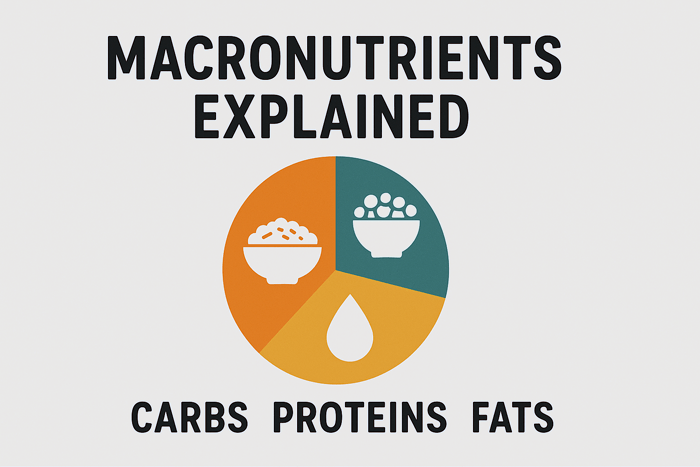Macronutrients Explained: Carbs, Proteins & Fats in Your Diet
When it comes to nutrition, the word macronutrients often pops up. These are the nutrients your body needs in large amounts to function properly — namely carbohydrates, proteins, and fats. Understanding their roles is key to building a healthy and sustainable diet. Whether your goal is weight loss, muscle gain, or simply feeling more energetic, knowing how to balance these macronutrients can make all the difference.
1. Carbohydrates – Your Body’s Main Energy Source
Carbohydrates are the body’s preferred fuel. When you eat carbs, your digestive system breaks them down into glucose, which your body uses for energy in daily activities — from walking to intense workouts.
Types of Carbs:
- Simple Carbs – Found in foods like sugar, candy, and soft drinks. They provide quick energy but can lead to rapid blood sugar spikes.
- Complex Carbs – Found in whole grains, legumes, vegetables, and fruits. These are digested slowly, providing a steady energy supply.
Why You Need Them:
Carbs fuel your brain, muscles, and vital organs. Skipping them entirely can lead to fatigue, poor concentration, and mood swings.
Healthy Sources:
- Whole wheat bread and pasta
- Brown rice, quinoa, and millets
- Sweet potatoes
- Fresh fruits and vegetables
Pro Tip: Choose whole, minimally processed carbs over refined ones. Pairing carbs with protein or healthy fats can also prevent sharp blood sugar spikes.
2. Proteins – The Building Blocks of Your Body
Protein is essential for building and repairing tissues, producing enzymes and hormones, and supporting immune function. If you’re active or recovering from illness, your protein needs may be higher.
Why You Need Them:
- Support muscle growth and repair
- Help in making antibodies to fight infections
- Maintain healthy hair, skin, and nails
Healthy Sources:
- Animal-based: Eggs, chicken, fish, lean meat, dairy products
- Plant-based: Lentils, beans, tofu, tempeh, nuts, seeds
How Much Do You Need?
Protein requirements vary based on age, gender, activity level, and health goals. On average, adults need 0.8–1.2 grams of protein per kilogram of body weight, but athletes and those with specific goals may require more.
Pro Tip: Spread protein intake evenly across meals to maximize absorption and muscle synthesis.
3. Fats – More Than Just Energy Storage
Fats are often misunderstood. While excess unhealthy fats can harm health, the right kinds of fats are essential for your body. They support cell growth, protect organs, and help absorb vitamins A, D, E, and K.
Types of Fats:
- Healthy Fats (Unsaturated) – Found in nuts, seeds, avocados, and olive oil. Good for heart health and reducing inflammation.
- Unhealthy Fats (Trans & Excess Saturated) – Found in fried foods, processed snacks, and certain baked goods. These can raise cholesterol and increase the risk of heart disease.
Why You Need Them:
- Provide long-lasting energy
- Support brain function and hormone production
- Improve skin health
Healthy Sources:
- Almonds, walnuts, chia seeds, flaxseeds
- Avocado
- Fatty fish like salmon and mackerel
- Olive oil and mustard oil
Pro Tip: Avoid completely eliminating fats from your diet. Focus on moderation and quality.
How to Balance Macronutrients in Your Diet
A balanced diet typically contains all three macronutrients in the right proportions, adjusted according to your health goals and lifestyle. While there’s no one-size-fits-all ratio, a general guideline for many adults is:
- 45–55% of daily calories from carbohydrates
- 20–35% from fats
- 15–25% from protein
However, these numbers can change depending on factors such as activity level, weight goals, and medical conditions. For example, an athlete may need more protein, while someone managing diabetes may require controlled carb intake.
Tips for Creating a Balanced Plate:
- Fill half your plate with vegetables and fruits.
- Include a lean protein source in every meal.
- Choose whole grains instead of refined ones.
- Include healthy fats in moderation.
- Stay hydrated — water supports all metabolic processes.
Common Myths About Macronutrients
Myth 1: Carbs make you gain weight.
Truth: Excess calories cause weight gain, not carbs alone. Choosing whole carbs in the right portion can support weight management.
Myth 2: High-protein diets damage kidneys.
Truth: For healthy individuals, high-protein diets are generally safe. Those with kidney conditions should follow medical advice.
Myth 3: All fats are bad.
Truth: Healthy fats are essential for optimal health. Only trans fats and excessive saturated fats should be limited.
Why Professional Guidance Matters
While you can read about macronutrients online, your unique body composition, lifestyle, and medical history determine the ideal balance for you. Self-experimentation without proper guidance can lead to nutrient deficiencies or unwanted weight changes.
This is where working with a qualified dietician makes a difference. A professional can:
- Assess your current health status
- Customize macronutrient ratios for your needs
- Suggest practical meal plans
- Help track your progress and make necessary adjustments
Final Thoughts
Macronutrients are the foundation of your diet. Carbohydrates give you energy, proteins build and repair your body, and fats support essential functions. The key is not to fear any of them but to include the right types in the right amounts.
A balanced approach, tailored to your goals, can improve energy levels, support healthy weight, and reduce the risk of chronic disease.
Looking for a Personalized Nutrition Plan in Ahmedabad?
Dr. Rushikesh Trivedi, a highly experienced and trusted dietician in Ahmedabad, can help you create a balanced, enjoyable, and effective diet plan tailored to your goals. Whether you want to lose weight, build muscle, or manage a health condition, Dr. Trivedi combines scientific knowledge with practical guidance to help you achieve lasting results.
📞 Call: 099133 30931 : Call today to book your consultation and take the first step toward a healthier, more energetic you!


